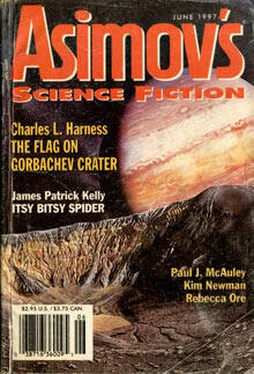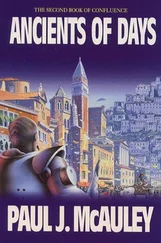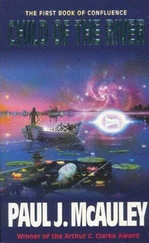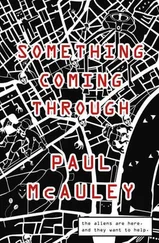“We didn’t save her, Ray. That was in your TV movie, The Omega Encounter. We got her back, but the things they’d put inside her killed her anyway.”
“Well, we got her back, and if fuckin’ Doc Jensen had listened, we would have saved her, too!”
I sit there, looking into the flashlight beam with drunken tears running down my face.
“How much do you remember, Ray? Not the movies, but the real thing? Do you remember how we got Susan out of the mothership?”
“I stay away from shopping malls, because they give me flashbacks. Maybe I’m as crazy as Nyquist. Sometimes, I dream I’m in one of those old-fashioned hedge mazes, like in The Shining. Sometimes, I’m trying to get out of the hospital they put us in afterward. But it’s always the sanje, you know.”
Mitchell switches off the flashlight. I squint into the darkness, but all I see is swimming afterimages.
“Come tomorrow,” Mitchell says, and something thumps beside me.
It is a rock, with a piece of torn paper tied to it. Under the dome light of the rental car, I smooth out the paper and try to make sense of the map Mitchell has drawn.
Two days. That’s how long it took. Now, my life is split into Before and After. What no one gets is that the thing itself—the event, the encounter, the invasion, the incursion, the whatever—was over inside two days. I’ve had head colds and belly-aches that lasted a whole lot longer. That’s what marks me out. When I die, my obits will consist of three paragraphs about those two days and two sentences about everything else. Like I said about Jan-Michael, I have a post-birth, pre-death rut for a life. Except for those two days.
After about a decade, it got real old. It was as if everyone was quizzing me about some backyard baseball game I pitched in when I was a kid, blotting out all of the rest of my life—parents, job, marriages, kid, love, despair—with a couple of hours on the mound. I even tried clamming up, refusing to go through it all again for the anniversary features. I turned my back on those two days and tried to fix on something else worth talking about. I’d come close to making it with Adrienne Barbeau, didn’t I? Or was it Heather Locklear? Maybe it was just in one of the scripts and some actor played me. I was doing harder stuff than alcohol just then.
That phase lasted maybe three months. I was worn down in the end. I realized that I needed to tell it again. For me, as much as for everyone else. I was like those talking books in that Bradbury novel—yeah, I admit it, I read science fiction when I was a kid, and doesn’t that blow my whole story to bits, proving that I made it all up out of half-remembered bits of pulp magazine stories—my whole life was validated by my story, and telling it was as necessary to me as breathing. Over the years, it got polished and shiny. More than a few folks told me it sounded like Bradbury.
“A million years ago, Nyquist’s farm was the bottom of the ocean,” I would always begin, paraphrasing the opening of my book. “Susan Nyquist collected sea-shells in the desert. Just before I looked up and saw the spinning shape in the sky, I was sifting through the soft white sand, dredging up a clam-shaped rock that might once have been alive…”
No, I’m not going to tell it all again here. That’s not what this is about at all.
Do you know what a palimpsest is? It’s old parchment that has been written on once, had the writing rubbed out, and been written on again. Sometimes several times. Only, with modern techniques, scientists can read the original writing, looking underneath the layers.
That’s my story. Each time I’ve told it, I’ve whited out the version underneath. It’s built up, like lime on a dripping faucet. In telling it so many times, I’ve buried the actual thing.
Maybe that’s why I’ve done it.
Regardless of the movies, it wasn’t a B picture, with simple characters and actions. Okay, there were aliens (everyone else calls them that except Strieber, so I guess I can too), a woman was taken, and we poisoned most of them and dug out dynamite and blew up their spaceship (I’ve never liked calling it that—it was more like one of Susan’s shells blown up like a balloon, only with light instead of helium or air). We saved the world, right?
Or maybe we just killed a bunch of unknowable Gandhis from the Beyond. That’s what some woman accused me of at a book-signing. She thought they’d come to save us, and that we’d doomed the world by scaring them off.
That gave me a shock. I tried to see the stoiy the way she might.
It didn’t play in Peoria. The woman—pink bib overalls, bird’s-nest hair, Velma-from- Scooby-Doo glasses, a “Frodo Lives!” badge—hadn’t seen the visitors, the aliens.
She hadn’t seen what they’d done to Susan.
But I was up close.
The little fuckers were evil. No, make that Evil. I don’t know if they were from outer space, the third circle of Hell, or the Land of Nod, but they weren’t here to help anyone but themselves.
What they did to the cattle, what they did to Susan, wasn’t science, wasn’t curiosity. They liked taking things apart, the way Mikey Bignell in third grade liked setting fire to cats, and Mikey grew up to get shot dead while pistol-whipping a fifty-two-year-old married lady during a filling station hold-up. If the visitors ever grow up beyond the cat-burning phase, I figure they could do some serious damage.
I am not just trying to justify what we did to them.
Now, without trying to tell the stoiy yet again, I’m tapping into what I really felt at the time: half-scared, half-enraged. No Spielberg sense of wonder. No TV movie courage. No Ray Bradbury wistfulness.
“Inside the Ship was all corridors and no rooms, criss-crossing tunnels through what seemed like a rocky rubber solid stuff. Mitchell went ahead, and I followed. We blundered any which way, down passages that made us bend double and kink our knees, and trusted to luck that we’d find where they’d taken Susan. I don’t know whether or not we were lucky to find her or whether they intended it. I don’t know if we were brave and lucky, or dumb rats in a maze.
“Mitchell claims the thing told us where to go, flashed a floor-plan into our minds, like the escape lights in an airliner. I guess that’s his scientific mind talking. For me, it was different. I had a sense of being myself and being above myself, looking down. We didn’t take a direct route to Susan, but spiraled around her, describing a mandala with an uneven number of planes of symmetry. It was like the New Math: finding the answer wasn’t as important as knowing how to get there, and I think Mitchell and I, in our different ways, both flunked.”
I didn’t say so in the book, but I think that’s why what happened to Susan afterward went down. When we dragged Susan, alive but unconscious, out of the hot red-black half-dark at the heart of the ship we were too exhausted to feel any sense of triumph. We went in, we found her, we got her out. But we didn’t get the trick quite right.
Here’s how I usually end it:
“Nyquist was shaking too bad to aim the rifle. I don’t amount to much, but while I can’t shoot good enough to take the eye out of the eagle if you toss a silver dollar in the air, nine times out of ten I’ll at least clip the coin. Mitchell was shouting as he ran toward us with two of the things hopping after him. The reel of wire was spinning in his hands as he ran. Nyquist snapped out of it and tossed me the gun”—in his version, he gets both of the critters with two shots, bing-bang—“and I drew a bead, worried that Mitchell would zigzag into the line of fire, then put a bullet into the first alien. Pink stuff burst out of the back of it in midleap, and it tumbled over, deflating like a pricked party balloon.
Читать дальше












